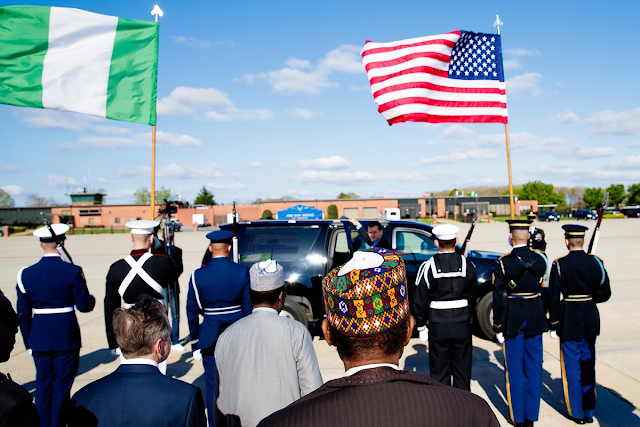Buhari In Washington: Five Things to Watch
Even before the trip commenced, there has been a mini-controversy in Nigeria. Nigerian officials and Buhari’s supporters have largely echoed US commentators in describing the meeting as the first by an African leader. Egypt’s President Sisi, who met Trump in April last year, in fact holds that distinction – whatever that’s worth! For Washington’s policy community, Egypt is in the middle east – it’s the only African country not covered by the US’ Africa Command for example. This explains the ‘non’-controversy.
Strengthened security cooperation and economic investment will be the focus of Buhari and Trump’s discussions.
Both Presidents will discuss “ways to enhance our strategic partnership and advance our shared priorities: promoting economic growth and reforms, fighting terrorism and other threats to peace and security, and building on Nigeria’s role as a democratic leader in the region”, according to a White House press release.
President Buhari’s itinerary will also include meeting with “business persons in agriculture and agro-processing, dairy and animal husbandry later in the day”, according to an April 27 press release by Femi Adesina, the President’s special adviser on media and publicity. Nigerian officials will also be meeting “executives of major US companies in the areas of agriculture, aviation and transportation”, Adesina adds.
With the controversial A-29 Super Tucano saga between the two governments now seemingly resolved – Nigeria paid for the 12 aircrafts in February and the US is scheduled to deliver them in 2020 – deliverables from the trip are more likely to come from the discussions on trade and investment. The fact that Defence Minister Mansur Dan-Ali doesn’t appear to be part of the President’s delegation reinforces this assessment.
In this regard, we should look out for possible developments in these five areas: railway, aviation, commercial and investment dialogue, financing arrangements, and trade agreement.
Adesina’s press release says the $2bn railway concession agreement to upgrade and operate the Lagos to Kano line and Port Harcourt to Maiduguri line – also called the Western and Eastern Lines – will be “negotiated and finalized” during the trip. A General Electric-led consortium, which includes South Africa’s Transnet, Dutch-based APM Terminals and China’s Sinohydro, was selected in May last year as the preferred bidder for the concession. This will obviously be significant.
A second initiative to pay attention to will be to see what fruits the meeting between Nigerian officials and the aircraft manufacturer Boeing will yield. Adesina’s press release says the discussions will center on the “National Carrier Project” – Buhari’s pet project to revive the defunct Nigeria Airways. This might be an auspicious time for deal-making with Boeing. “Preparing for the imminent collapse of the Iran nuclear deal, Boeing Co. has been signing contracts with other buyers … to cushion the loss of $17 billion in sales to Iran”, says Barbara Slavin, an Iran expert at the Atlantic Council.
The possible launching of the Commercial and Investment Dialogue – the latest instrument of engagement between the two countries – will be another initiative to anticipate. Adesina’s press release is silent on this. The Memorandum of Understanding establishing the CID was signed in November last year and it was scheduled to launch early this year. The CID is designed to “strategically engage the private sectors of each country” and to enhance the bilateral commercial and investment ties of both countries.
A fourth development to anticipate will be to see what the results of the meeting to, according to Adesina’s press release, “explore competitive financing arrangements” between Nigerian officials and officials from the US’ Export-Import Bank and the Overseas Private Investment Corporation. There appears to be an acceptance in Washington that the US has no legs to stand on if all it has to offer are dry lectures of the dangers of Chinese infrastructure financing without offering a credible alternative. In his remarks to the press last month while in Abuja, then-Secretary of State Rex Tillerson said: “we are developing mechanisms and the President has charged some of his executive staff back home to begin to develop alternative financing mechanisms that will also create alternative opportunities to what China is offering”. It will be interesting to see how far in gestation this initiative is.
A fifth, admittedly far-fetched, possibility is a trade deal. The only Free Trade Agreement the US currently has with an African country is with Morocco. In January, the US Trade Representative Robert Lighthizer hinted that another one was being considered. He said the US will soon strike a “model” free trade agreement with a “properly selected” African country. J Peter Pham, the Director of the Atlantic Council’s Africa Center who was last year shortlisted to fill the still vacant (as at the time of writing) role of the State Department’s top Africa envoy, has argued that Nigeria’s large economy and population makes it a viable candidate. One key mitigating factor is the protectionist mood in Abuja. Having refused to thus far sign an FTA with the EU and failed to join the AU’s FTA, it’s difficult to see how a US-Nigeria FTA will become any more appealing.
Beyond the bilateral relationship, both Trump and Buhari will also be looking to project a broader message from their meeting, says John Campbell, a former US Ambassador to Nigeria. For Buhari, the visit will “enhance Nigeria’s leadership in West Africa”, while for Trump it offers “an opportunity to make amends” for his derogatory attitude towards Africa.
I am sceptical both will be successful in communicating that broader message. Nigeria’s diminished regional stature stems, not from a lack of visits to the White House, but from Abuja’s manifest incapacity to provide regional public goods like security and economic development. And the perceptions that Trump has little interest in Africa will only be erased when the White House unveils a positive vision – as opposed to more drone bases and anti-China lecture tours – of how it wants to engage the countries of the Continent.



Comments
Post a Comment